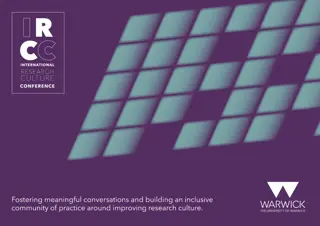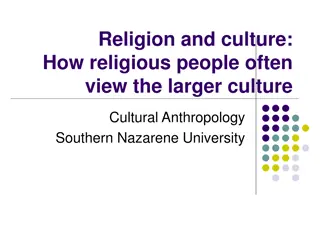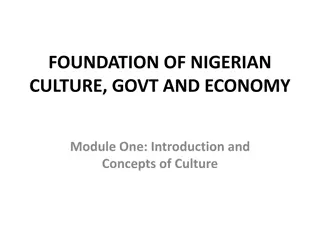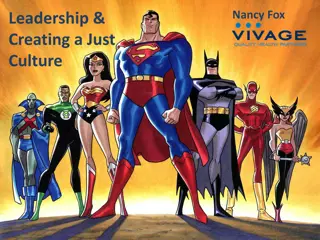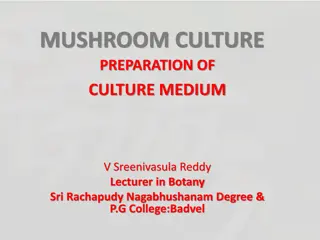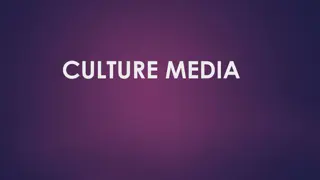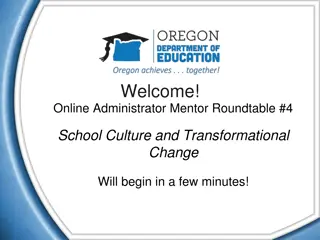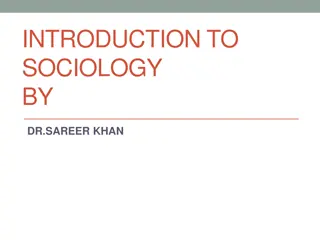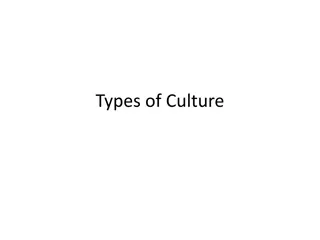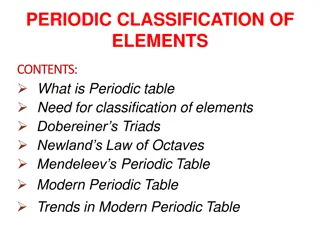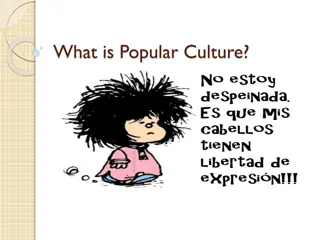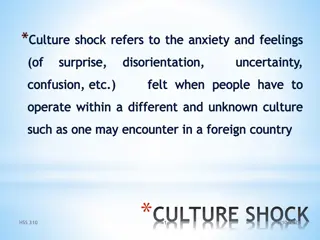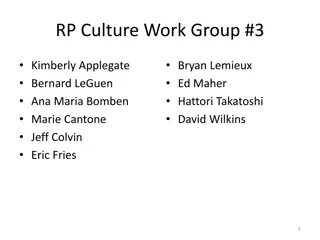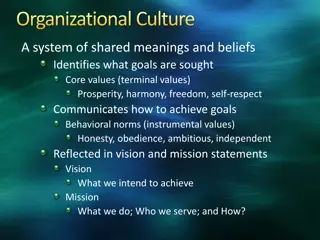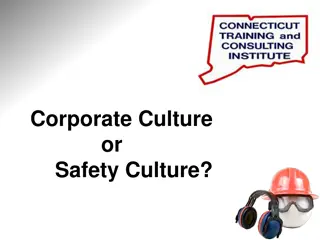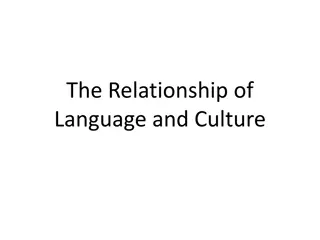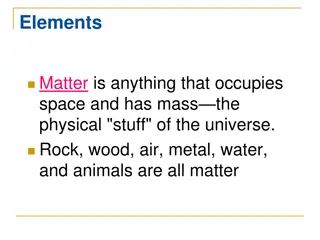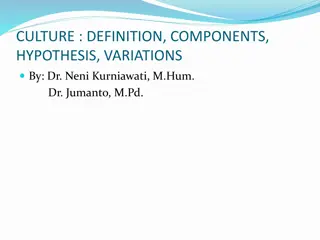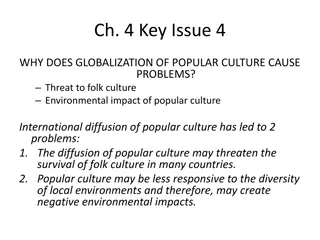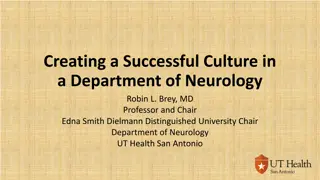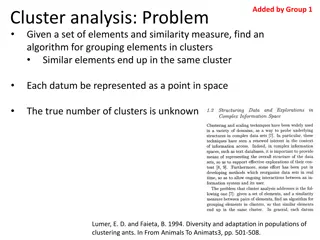IRCC International Research Culture Conference 2023: Empowering Global Communities
Explore the transformative potential of co-production in research and enterprise culture at the IRCC International Research Culture Conference 2023 hosted by Heriot-Watt University. Join Professor Jemina Napier, Dr. Fiona Armstrong, and Catalina Bastidas to delve into developing a purposeful global
10 views • 10 slides
Understanding Organizational Culture and Generational Myths in the Workplace
Explore the impact of organizational culture on employee engagement, the aspects shaping workplace culture, and the debunking of generational myths in the modern workforce. Discover how leadership can create a cohesive culture that benefits employees of all generations.
1 views • 39 slides
Enhancing University of Warwick's Research Culture through Work Experience Programs and Staff Development
This project aims to address social mobility issues in STEM by developing a research culture at the University of Warwick. Through internal funding sources, the project focuses on enhancing work experience programs and enabling staff development to support the wider university community. Key activit
3 views • 12 slides
Understanding the Periodic Table and Chemical Bonds in Physical Science
The periodic table organizes elements based on their properties, with rows representing periods and columns representing groups. Mendeleev's early table laid the foundation for predicting undiscovered elements. Today's periodic table orders elements by atomic number, showcasing the periodic law and
3 views • 15 slides
Perspectives on the Relationship Between Religion and Culture
Religious people often perceive the larger culture in different ways, as illustrated by Richard Niebuhr's classic positions in "Christ and Culture" and Charles Kraft's later perspectives on God's role in culture. These viewpoints range from rejecting cultural influence to integrating Christianity an
1 views • 14 slides
Understanding Organisational Culture and Placement Etiquette
Explore the significance of organisational culture and placement etiquette in the context of thriving in a placement. Understand the impact of aligning personal values with company culture for a fulfilling career. Discover tips on assessing organisational culture during interviews to make informed d
0 views • 7 slides
Understanding Culture and Society
Culture and society are interconnected concepts, where culture encompasses beliefs, behaviors, and objects shared within a community, shaping their identity and values. Society, on the other hand, comprises individuals interacting based on common cultural bonds, whether ethnic, gender-based, or thro
0 views • 12 slides
Cultivating an Effective Data Culture: Strategies and Insights
Explore the key elements of developing a data-informed culture through national guidance, research insights, and practical considerations. Learn about creating a safe space for collaboration, effective data systems and processes, and the impact of a positive culture on teaching and learning. Gain va
1 views • 24 slides
Understanding Nigerian Culture, Government, and Economy: Module One
Delve into Module One of the course on Nigerian culture, government, and economy with a focus on the Introduction and Concepts of Culture. Explore definitions of culture, various types of culture, characteristics, importance, related concepts, levels, and differences between culture and ethnic group
1 views • 31 slides
Understanding Just Culture in Leadership: Creating a Fair and Error-Preventive Environment
Punitive culture in institutions can lead to mistakes being hidden, affecting error prevention. Dr. Lucian Leape highlights the importance of avoiding punishment for errors, advocating for a Just Culture model. This model, coined by David Marx, recognizes human error and helps differentiate between
0 views • 24 slides
Mushroom Culture: Preparation of Culture Medium and Edible Mushroom Examples
Mushroom culture involves the preparation of culture medium for cultivating various edible mushrooms. This process includes the systematic classification, structure, and examples of edible mushrooms. The medium preparation methods and materials are essential for successful mushroom cultivation. The
0 views • 24 slides
Culture Media
Culture media play a crucial role in isolating bacteria from clinical specimens. Water, electrolytes, peptone, agar, meat extract, yeast extract, and blood/serum are essential constituents used in culture media. These components provide nutrients, solidifying agents, and growth factors necessary for
1 views • 26 slides
Understanding Plant Tissue Culture: Methods and Requirements
Plant tissue culture involves the in-vitro culture of plant explants under aseptic conditions, covering cell, organ, and suspension cultures. This process, pioneered by German botanist Gottlieb Haberlandt, relies on the totipotency of plant cells. Key requirements include laboratory organization, su
0 views • 18 slides
Leading to Safety
Examining the crucial link between organizational culture and safety programs, this content emphasizes the importance of fostering a culture of safety within organizations to ensure the success of safety initiatives. It explores the process of changing organizational culture, starting from defining
0 views • 20 slides
School Culture and Transformational Change Roundtable
Explore the importance of school culture and transformational change in an online roundtable setting. Participants will discuss current roles, prior knowledge, objectives, and guiding questions related to reshaping school culture. Learn about the impact of positive school culture on staff, students,
0 views • 25 slides
Understanding Culture in Sociology: Key Concepts and Definitions
Culture is the cornerstone of society, distinguishing humans from animals and shaping our social lives. Sociologists define culture as the shared values, practices, norms, and beliefs that govern our interactions and behaviors. This comprehensive guide explores the non-material aspects of culture, i
1 views • 30 slides
Understanding Plant Tissue Culture Media and Their Importance in In Vitro Growth
Plant tissue culture media play a crucial role in the in vitro growth and morphogenesis of plant tissues. The composition of culture media depends on the specific plant species and the type of material used for culture. Various types of media, such as White's medium, MS medium, B5 medium, N6 medium,
0 views • 6 slides
Overview of Cell Culture Methods and Importance in Research
Introduction to the principles of cell culture, including tissue culture, organ culture, and cell culture methods. Discusses the advantages and disadvantages of each technique and highlights the need for cell culture in research for studying cellular behavior and large-scale production of cell mater
3 views • 45 slides
Understanding Popular Culture: Classification and Impact
General classification of culture includes Popular, High/Elite, Low/Subculture, Primary & Secondary, Folk, and Co-Culture. Popular culture, shaped by mass media, encompasses ideas, attitudes, and phenomena favored by society. It influences daily life, with examples like styles of dress, slang, and s
1 views • 16 slides
Evolution of Periodic Table and Classification of Elements
The Periodic Table is a systematic arrangement of elements based on atomic number and properties. Over time, chemists developed various classification methods such as Dobereiner's Triads, Newland's Law of Octaves, Mendeleev's Periodic Table, and the Modern Periodic Table to organize the increasing n
1 views • 26 slides
Perspectives on Youth Culture Through Functionalist and Neo-Marxist Views
Functionalist and Neo-Marxist perspectives on youth culture offer contrasting views on its purpose in society. Functionalist theorists emphasize the role of youth culture in providing a transitional phase for young people, aiding in their social integration and development of independence. On the ot
0 views • 11 slides
Understanding Popular Culture and Ideology
Popular culture encompasses the lived practices and artistic products of society, contrasting with high culture. Various definitions highlight its appeal to a wide audience and its distinction from high culture. The relationship between popular culture and ideology is explored through practices that
0 views • 15 slides
D-Block Elements: Properties and Classification in Chemistry
Welcome to the Department of Chemistry at Kisan Veer Mahavidyalaya, Wai. Explore the Chemistry of Elements of the 3d series, focusing on d-Block Elements and Transition Elements. Learn about their electronic structure, colored ions, magnetic properties, oxidation states, and complex formation. Under
0 views • 34 slides
Understanding Cultural Adjustment: Navigating Different Ways of Life
Cultural adjustment involves experiencing culture shock when encountering a new way of life due to immigration, travel, or a shift in social environments. This process includes symptoms like excessive concern, fear of physical contact, and refusal to learn the host country's language. Overcoming cul
0 views • 12 slides
Understanding Culture Shock: Phases, Symptoms, and Coping Strategies
Culture shock is the anxiety and disorientation experienced when adapting to a new and unfamiliar culture. This phenomenon involves various stages, from the honeymoon phase to readjustment and reverse culture shock. Symptoms of culture shock can be physiologically, psychologically, and socially base
1 views • 11 slides
Proposed NRC Safety Culture Policy Statement Overview
This document provides an overview of the proposed Nuclear Regulatory Commission (NRC) Safety Culture Policy Statement presented by Eric Fries, the Safety Culture Program Manager. It covers topics such as NRC's mission, responsibility, safety culture background, draft policy statement, current statu
0 views • 24 slides
Elements of RP Culture and Proposed Safety Traits
This presentation delves into the important elements of RP culture, criteria for success, stakeholder engagement, the role of RP professionals, and the inclusion of regional culture. It also highlights commonalities in knowledge, leadership, behavior, and action across disciplines. Additionally, it
0 views • 14 slides
Plant Tissue Culture Methods for Growth and Reproduction Study
Plant tissue culture methods such as root tip culture, shoot-tip culture, leaf culture, flower culture, and anther and pollen culture allow for the study of growth, reproduction, and genetic variations in plants. These techniques involve culturing various plant parts under sterile conditions to inve
1 views • 20 slides
Semantic Data Model of Electronic Invoicing Core Elements
Presentation by Fred van Blommestein on the EN16931-1 semantic data model of core elements in electronic invoicing, covering invoice processes, core invoice design, semantic model details, business rules, and invoicing principles. The model includes 160 elements in 33 groups, with mandatory elements
0 views • 13 slides
Understanding Organizational Culture and Its Impact on Business Success
Organizational culture encompasses shared beliefs, values, and behaviors within a company. It influences goal-setting, strategies, and employee actions. The transmission of culture is vital for aligning values with business practices. Culture matters for client relations, differentiation, and managi
0 views • 17 slides
Understanding Corporate Culture vs. Safety Culture in Organizations
Explore the dynamics of corporate culture and safety culture within organizations through a series of images and quotes. Learn about aligning goals, promoting a culture of safety, and the crucial factors that contribute to a safe workplace environment. Delve into the responsibilities of management,
0 views • 38 slides
The Intricate Relationship Between Language and Culture
Language serves as a vital tool for social interaction, intricately woven into the fabric of culture. It expresses, embodies, and symbolizes cultural realities. In the interplay of nature and culture, language immortalizes and transforms elements like roses, embodying essential aspects of society. T
0 views • 9 slides
Exploring the World of Matter and Elements
Matter is the physical "stuff" of the universe, encompassing elements that make up rocks, wood, air, metals, water, and living organisms. Chemical elements are the building blocks of matter, with essential elements like oxygen, carbon, hydrogen, and nitrogen constituting a significant part of living
0 views • 24 slides
Understanding Culture: Definition, Components, and Variations
Culture encompasses the entire way of life for a group of people, comprising material and symbolic elements passed down through generations. Categories include material and symbolic culture, with aspects like beliefs, customs, gestures, language, norms, and artifacts shaping cultural identity. Langu
0 views • 15 slides
Certificate Courses in Indian Cultural Studies by Department of Vedic Sciences & Indian Culture
Explore month-long certificate courses in Indian Cultural Studies offered by the Department of Vedic Sciences & Indian Culture in collaboration with Sri Aurobindo Foundation for Indian Culture. Delve into India's rich cultural heritage to gain insights into ancient wisdom traditions, prepare for con
0 views • 8 slides
Challenges of Globalization in Popular Culture
Globalization of popular culture presents challenges such as the threat to folk culture and negative environmental impacts. Rising incomes lead to a shift from folk to popular culture, affecting traditional values and clothing symbolism. The adoption of Western clothing in Middle Eastern countries f
0 views • 12 slides
Understanding S-Block Elements in the Periodic Table
The s-block elements in the Periodic Table consist of 14 elements with unique properties and characteristics. Lithium, sodium, and potassium are notable members of Group 1, characterized by their reactivity and ability to form alkaline solutions when in contact with water. These soft metals exhibit
0 views • 23 slides
Cultivating a Successful Culture in Neurology Department
Importance of culture in a neurology department highlighted by Dr. Robin L. Brey. Emphasis on how culture trumps strategy and the role of leaders in maintaining a positive culture. Examples and insights on how culture influences decision-making and behavior. Attributes of a successful culture and ho
0 views • 21 slides
Aerobic Gymnastics Competition Guidelines and Rules
The guidelines for aerobic gymnastics competitions include compulsory elements, categories, competition spaces, deductions, and specific rules for different age groups. The competitions have specific parameters for elements allowed, lifting, floor elements, music length, maximum difficulty elements,
0 views • 17 slides
Cluster Analysis: Grouping Elements into Clusters with Similarity Measures
Given a set of elements and a similarity measure, the algorithm aims to group elements into clusters where similar elements are grouped together. Each element is represented as a point in space, and the true number of clusters is unknown. The clustering algorithm is inspired by the behavior of ants
0 views • 15 slides


